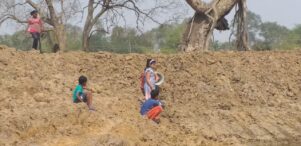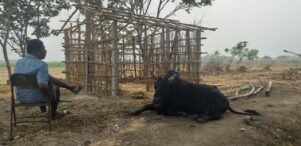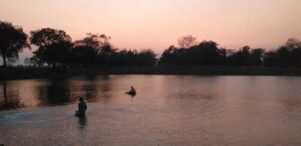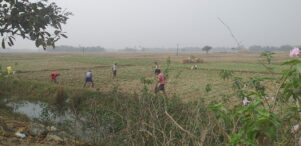Today, when I look back to my childhood in my village, it’s not the education that I remember as the most exciting incident. The flash of celebrating different festivals, making idols and toys with mud, being involved in farming activities, creating accessories from bamboo and wood, fishing, playing local games, decorating pandals for puja, plucking fruits and berries from the nearby farms etc. top the list. Living with the scope to try out so many things around the year has offered to develop different tastes and more importantly an opportunity to try and explore life in its natural form. It’s after completion of engineering; I could get awareness about the career opportunity of product designer that best nurtures the skills, which I used to apply to make toys, furniture, idols, from bamboo, mud, straw, plastic. However, I could not pursue my career as I missed to fill up the form for the entrance examination. Later, within other priorities from family, my career took a different turn. After engineering to profession of teaching to Ph. D, I somewhat took a ride through the crowd till I realized the push for standing out. But still today, at times I wish I could have done more justice to the designer in me through formal education. This recall along with other key incidents of my life brings the following observations towards grooming a child within and beyond the education system.

- Trying different Tastes of Engagement
Today, the young generation finds it difficult to locate their strength, weakness, and ambition. By the time they are about to graduate, they still appear to be clueless about their decision for selecting the apt discipline. Most of the time, grooming the borrowed dreams misses personal nurture. As a result, today, we see a minuscule percentage of professionals attempting to divert their careers after the realization of mismatch between profession and interest. In contrast, most learn to live with it. Therefore, exposing children to diverse activities during childhood creates a deep pool of experiences that supports better decision-making while growing. Besides, the curiosity to try new things should be considered as a very fundamental part of our existence to keep ourselves more humanly and natural.

- Practice for a Thick and Thin Living
I see parents stretching to the peak to offer their children a better life despite all troubles around them. In this process of selfless commitment, it’s also essential for the child to get exposed to the uncomfortable situations of life. Experiencing and practicing to respond to it from a very early age will enhance the tolerance bandwidth of the child and prepare for self-sustainability during tough times. For example, children being regularly ferried on vehicles should also be encouraged to walk sometimes. Family living with dedicated power supply should also practice living off-grid. Even if occasionally, practices of living with minimal water at home, growing food at home, spending a day without machine will not only bring new realization to lifestyle but also create respect for the limited and dying resources around us.

- Bringing the Uncertainty into Practice
Often, institutions like schools, where a child spends 6 to 7 hours every day, are strictly driven by discipline and timetable. The children gradually develop a mechanized habit to respond (rather repeat) to an organized set of guidelines e.g.; timetable, teacher, classroom, writing board, sitting pattern, pattern, and periodicity of the bell, prayer, almost every day. Over-conscious parents sometimes have their timetable for the child’s engagement. Too much-organized living and thinking, to my belief, has all possibility to steal away the skill and spirit of the child to tackle the unknown from the randomness.
These days, “uncertainty” has even become more regular in different forms of natural and manmade disasters. As an impact of climate change, natural disasters have become more erratic than just a seasonal phenomenon. Also, the mal-handling of natural resources and ecological harmony has created a serious environmental crisis with a direct threat to life. Moreover, pandemics like long lasting outbreak with the power to shake the civilization puts a clear message, we have to stay prepared to face anything worst coming ahead. Besides, none can imagine except the elites, what’s trending in the list of technological eruptions, next to digital tracking and algorithmic manipulation of human behavior, to cyber bullying and misinformation-based social disasters. Is our next generation prepared to stay mentally alert to respond to such variants?
It’s high time for all educators and parents to think about how to maximize the interaction of the child to the random environments that are no more a scene from a sci-fi movie, but an utter reality to live with. How to help them respond better with time. Practicing to respond to the randomness will not only bring more enthusiasm for the child to respond and be original in its capacity but also slowly build up the psychological shield to meet such crisis in future.

- Making Disciplines Intersect
In the age of disruptive technologies and the eruption of large-scale innovation within a short frame of time, it’s impossible to predict what of today will exist after few years. The wheel of scientific discoveries, tech innovations, social living, everything is taking a faster ride than ever before and has made everything look flat. Today, every professional sector is driven by technologies and hence prone to sheer transformation with time. As an example – students, whose career as a Doctor appears to prescribe medicines and doing surgery in their future role might have to learn coding and a bit of engineering to work with robots for the complex surgery in a short period. Someone willing to opt for psychology as a career for studying the human brain and behavior might have to deal with algorithms to study the behavior of the profile during online activities. Unless the children at the school level are exposed to this foundation by practice, where knowledge and skills required for problem-solving don’t necessarily follow the boundaries of disciplines, we might miss out on great ideas and innovations at critical times.

- Recognizing Efforts over Benchmark
“Failure” as a taboo is deeply enrooted in our society. So, everyone is afraid to fail and hence wants to attempt what lies at their comfort. Such an attitude over time has resulted in a society that is more hesitant to try the untried and evolve, and more habituated to follow the established. From early childhood, the first presentation of “failure as an inferiority” comes only through education. Whether it’s securing fewer marks at examinations or not scoring a position in academic and allied competitions, a sense of inferiority is conveyed to the child by the surrounding in disguise mostly by the elderly community. In contrast, when the child doesn’t score well in a cricket match, the feeling is not the same. In the former case, the child is pushed to try harder to perform at all odds till it becomes an obsession. For the latter, self-motivation, and commitment leads to improvement while the child still enjoys the process, even if it demands hard work. So, there is an urgent need to shift the way we recognize the child’s effort and growth, within and beyond the education system.
By judging less and encouraging more, self-confidence is pumped into the child to believe and explore the greater possibilities within, which can only be achieved through multiple unsuccessful attempts, not necessarily portrayed as a failure, but as learning posts. I have come across instances within friends and students fraternity, who were average at studies, but are now performing appreciably well in their personal and professional sphere. Their dedication, fluidity in responding to situations, managing failures and opportunities, and more importantly, staying hopeful in the journey are the key, which they have learned from life, that has made this progress so far. I am still doubtful if the formal education system has the scope to facilitate this learning by practice.
(by – Amiya Singh)

